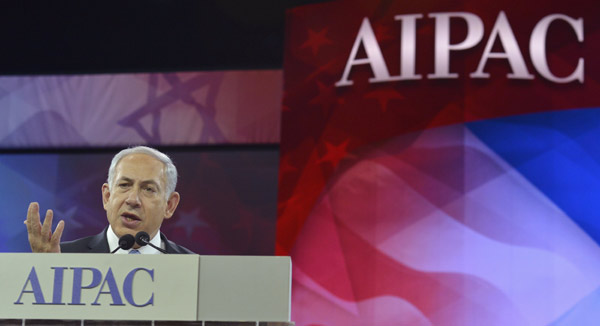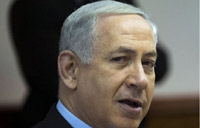Israeli PM urges more sanctions against Iran
Updated: 2014-03-05 10:57
(Xinhua)
|
|||||||||||
 |
|
Israeli Prime Minister Benjamin Netanyahu addresses the American Israel Public Affairs Committee (AIPAC), in Washington, March 4, 2014. Netanyahu urged world powers on Tuesday not to allow Iran to retain the ability to enrich uranium, saying it must be stripped of all nuclear technologies with bomb-making potential. [Photo/Agencies] |
WASHINGTON - Israeli Prime Minister Benjamin Netanyahu on Tuesday reiterated his long-held distrust of Iran over its nuclear program and called for more pressure against the Islamic republic.
|
 |
Allowing Iran to continue to enrich uranium would be a "grave error", Netanyahu said, adding that it leaves Tehran "as a threshold nuclear power" that could rapidly develop nuclear weapon.
Iran "wheels out its smiling president and its smooth-talking foreign minister. But if you listen to their words, their soothing words, they don't square with Iran's aggressive actions", Netanyahu said.
According to an interim deal signed in November, Iran agreed to halt some nuclear activities and allow more international inspections in exchange for easing some of the U.S.-led crippling economic sanctions.
But Israel remains deeply suspicious of the deal, describing it as a plot by Tehran to rid itself of the economic sanctions without completely giving up its nuclear ambitions.
Netanyahu called the deal a "historical mistake," warning that loosening the screws on Tehran in exchange for what he billed as minor concessions endangers Israel and other nations in the region.
At the AIPAC conference, Netanyahu also directly urged Palestinian President Mahmoud Abbas to recognize Israel as a Jewish state.
"President Abbas: recognize the Jewish state! And in doing so, you would be telling your people...the right of the Jewish people to a state of their own is beyond dispute," he said.
He added that he was prepared to make a "historic peace" that would "end a century of conflict and bloodshed," but not without a Palestinian acceptance of the Jewish state.
Israel and the Palestinians resumed peace talks last July after a three-year halt. U.S. Secretary of State John Kerry had aimed for a deal on all the final-status issues -- security, border, the status of Jerusalem and refugees, within nine months.
However, no visible progress has been made so far in the talks, and Kerry said last week that they will likely proceed beyond the original deadline of April.
Today's Top News
Kiev, Moscow start consultations over tensions
Attack prompts strengthened anti-terrorism legislation
Peace quest spurs defense push
Chinese market offers better times for the rich
Last 3 suspects caught in Kunming manhunt
Ukraine crisis hits Poland economy
Geely buys British startup Emerald
CNOOC licensed to seek Arctic oil
Hot Topics
Lunar probe , China growth forecasts, Emission rules get tougher, China seen through 'colored lens', International board,
Editor's Picks

|

|

|

|

|

|





